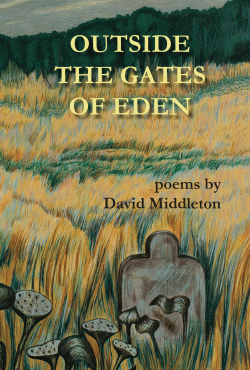William Faulkner once said of his own work that he was just “a failed poet.” Of course, Faulkner is at the lasting peak of American culture in his portrayal of mankind’s striving and endurance and cannot be any kind of failure.
The only thing I have in common with Faulkner is that we both write in prose—me being a very minor scribbler. But I know what Faulkner meant about the poets. The great poets reflect the soul of their people with a truth that transcends matter and reason.
Another notable Southern writer, Allen Tate, wrote that in America only the South had maintained a connection to the deepest spirit of Western civilization.
David Middleton’s newest book of verse, Outside the Gates of Eden, proves two things: that high Southern culture is still alive and that the South still retains a kinship with the soul of European civilization.
Middleton’s verse is a Christian, classical, Agrarian, and Southern vision of human life after the expulsion from Eden. Much reflects his beloved Louisiana with its different north and south—nature, extended family, history, current living. There are good poems on the jihad against the South as in “Lee in Darkness, regarding the politicians’ avowal that Lee’s statue was “a public nuisance,” followed by its removal to a warehouse confinement in darkness. But
“Yet on that pillar where so long he stood
There still remains the measure of the man,
A presence some can sense and none disturb . . .”
The poet James Matthew Wilson writes that Middleton’s verse treats the “high themes of human life, where rootedness in place is joined with metaphysical vision.”
A long-standing interest of the poet is in the paintings of rural French life by Jean-Francois Millet and others, the theme of several poems. These pictures are not pastoral idylls but what M.E. Bradford called “hard pastoral,” realistic but respectful views of life on the soil, a natural attraction for a traditional Southerner.
The distinguished scholar and poet Catharine Savage Brosman, like Middleton an Abbeville scholar, writes: “The poet’s moving word-pictures illustrate his sweeping vision . . . reflecting the flawed human condition, broken after Eden.”
The fine hardbound book may be obtained at $25 dollars from the usual sources and from Measure Press, a poetry publisher in Savannah.







2 Comments